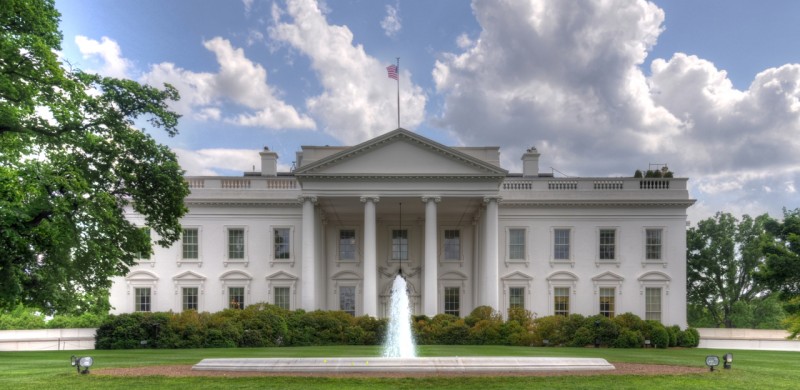
What the White House doesn’t know about marijuana policy
During today’s White House briefing, Press Secretary Sean Spicer was asked about the Trump administration’s position on marijuana enforcement. This issue has left marijuana advocates, business owners, investors, patients, and consumers wondering what the president’s true intentions are. As 28 states and DC have legalized medical marijuana and eight states and DC have legalized recreational marijuana, the administration’s position is one that will affect many Americans.
Spicer’s response drew a distinction between medical and recreational marijuana. He answered the initial question by stating,
“there are two distinct issues here: medical marijuana and recreational marijuana. I think medical marijuana, I’ve said before, the president understands the pain and suffering that many people go through who are facing, especially terminal diseases, and the comfort that some of these drugs, including medical marijuana can bring to them. And that’s one that Congress, through a rider in 2011…I think put in appropriations bill saying the Department of Justice wouldn’t be funded to go after those folks. There’s a big difference between that and recreational marijuana. And when you see something like the opioid addiction crisis blossoming in so many states around this country, the last thing we want to be doing is encouraging people—there is still a federal law that we need to abide by when it comes to medical—in terms of recreational marijuana and other drugs of that nature. There’s a big difference between medical marijuana which states—in the states where that’s allowed in accordance with the appropriations rider have set forth a process to administer and regulate that usage versus recreational marijuana and that’s a very, very different subject.”
There is a lot to break apart here, and while the issue of marijuana policy is clearly new to the press secretary and to the Trump administration, it is important to break a bit of this down to a few points for the White House to consider.
Medical marijuana and recreational marijuana are equally illegal under federal law.
Although Mr. Spicer is correct that an appropriations rider (formally, the Rohrabacher-Farr Amendment) prevents the Justice Department from spending money to crack down on medical marijuana in states that have approved reforms, that does nothing to address the illegality of the substance. In short, all the amendment says is that DOJ is prevented from enforcing federal law against medical marijuana growers, distributors, and buyers—who are still breaking the law. The Controlled Substances Act makes marijuana illegal in all cases—regardless of the purpose of its use. The Rohrabacher-Farr Amendment does not change that.
The suggestion that medical marijuana states have “set forth a process to administer and regulate” but recreational states have not is fundamentally false.
Recreational states that are currently up and running—Colorado, Washington, Oregon and Alaska—have been implementing significant and stringent administrative and regulatory systems around those policies. The only jurisdiction that has not done so—the District of Columbia—was prevented from doing it by one of President Trump’s supporters in the House, Rep. Andy Harris of Maryland. The District government intended to construct a recreational system that looked much like their medical system in terms of regulatory rigor. In fact, arguments can be made that recreational marijuana regulatory systems in the states that have come online (and in the states that are soon to come online) are more robust than a few of the states that have approved medical marijuana reforms. This distinction is important when disseminating information to the public—one of the roles Mr. Spicer prominently plays—because it reinforces the myth that every medical marijuana system in the U.S. is a tightly run ship and that recreational marijuana systems are free-wheeling, fly-by-night operations. I would encourage Mr. Spicer and other members of the Trump administration to meet with regulators from the Marijuana Enforcement Division in Colorado, the State Liquor and Cannabis Board in Washington, the Liquor Control Commission in Oregon and the Marijuana Control Board in Alaska to understand more clearly what these states are doing.
If President Trump believes in the medical value of cannabis, he can enact meaningful change.
There are many areas where presidential action and/or presidential leadership can go a long way in reforming the nation’s medical marijuana policy. Mr. Spicer was clear that the White House was supportive of medical marijuana and sees it as distinct from recreational marijuana. If so, the White House has a bit of a to-do list. President Trump can:
- Support reform proposals in Congress centered on medical marijuana such as the CARERS Act and others.
- Codify the Rohrabacher-Farr Amendment (now the Rohrabacher-Blumenauer legislation) that Mr. Spicer referenced to make it permanent law and not contingent on the continuing resolutions that fund our government or the standard appropriations process—if Congress can ever find a way to return to that.
- Reschedule cannabis or deschedule it with specific restrictions with regard to medical use.
- Deschedule non-intoxicating cannabidiol or CBD.
- Call for increased federal funding at NIH and other agencies to study the medical efficacy of marijuana.
- Appoint a drug czar and heads of the DEA and FDA who have similar beliefs to the president on this issue.
- Lift banking and tax restrictions for medical marijuana firms in ways that lower overhead costs for producers that are ultimately passed on to sick patients.
There is no shortage of ways in which a medical marijuana reform-oriented president can advance those ideas. If the White House is serious about it, President Trump can show the nation that he is more willing to address such issues and public needs than any of his predecessors.
Opioid use and marijuana use are not the same thing.
Mr. Spicer seemed to equate recreational marijuana use with the use of opioids and other drugs. People are dying every day across the United States because of opioids. Heroin is being cut with other, more deadly drugs like Fentanyl and causing a serious overdose crisis in the U.S. Those results are not happening with legal marijuana. Yes, legal marijuana has led to some public health issues and state regulatory systems have tried to respond to those challenges. Those public health issues are minor compared to what is happening with opioids in the states. Mr. Spicer should ask himself if he really believes heroin is as big a threat to Americans as a state-legal and regulated marijuana system. If he believes that answer is “yes,” then his equating the two is logical. If he believes the answer is “no,” he should abandon dangerous rhetoric that simultaneously hyperbolizes marijuana and delegitimizes the opioid crisis. Moreover, Mr. Spicer should read some of the research that suggests marijuana could be used as a substitute for opioids, helping opioid users distance themselves from that drug. That research isn’t a rumor in the marijuana industry; it is medical research coming from the University of Colorado, the University of Michigan, and elsewhere.
Recognize that marijuana legalization does not introduce marijuana to communities.
Recreational marijuana use happens in every state in the U.S. every day by hundreds of thousands of individuals. That includes states with and without recreational legalization. In states that have legalized, the regulatory systems ensure that the product is safer than black market product and that consumers know what they are getting in terms of potency and with regard to the presence of adulterants like mold or pesticides. Moreover, in state-legal systems, officials can use tax revenue to fund information, prevention, public health, and public safety campaigns that help deal with problems that can arise from marijuana use. In states without legal systems, those problems still arise, but states collect zero tax revenue from sales.
The White House can host a summit to address marijuana policy.
Mr. Spicer’s comments from the podium today showed some hesitation and some misunderstandings within the White House on marijuana policy. That same confusion exists among some in the public, as well. That is not a criticism of the White House; it is a reflection of the complex and ever-changing reality of marijuana policy in this country. The White House can show leadership and encourage a better-informed public and policy making community by convening the top experts on cannabis, public health, public safety, drug policy, and medicine to discuss the issue. The president has effectively brought together CEOs, labor leaders, minority communities, and other groups to discuss relevant issues— he can do the same on this issue.
Think about public opinion on marijuana.
The president has often spoken about returning the power to the people. Returning power to the people can take many forms. One is the decentralization of power to the states (closer governmental representatives of the public). Another is for the White House to be responsive to public opinion. For the former, the president can let states do what they like on marijuana policy and have the federal government get out of the way—a policy that should resonate well if the president is truly a small government conservative. For the latter, the answer is not only clear but was reflected by polling results released on the same day Mr. Spicer discussed marijuana from the podium. Quinnipiac University released a poll showing that 59 percent of Americans support recreational marijuana legalization and 71 percent of Americans want the federal government to get out of the way of states when it comes to marijuana policy. And you can bet a lot of that support comes from states President Trump won in 2016. The president may not believe that you can ‘Make America Great Again’ by legalizing marijuana, but if he wants states and citizens to be more in control of public policy, he should consider himself the last person who should try to get in the way.
To sum up, Mr. Spicer was bold in addressing a marijuana reform question head on and refusing to punt on it. His predecessors have not been so brave. He should continue to discuss this issue that matters to many Americans, and in the meantime, take today as an opportunity to push the White House to become better informed on the issue and think hard about what the best policy path forward could be.
More interesting stuff

